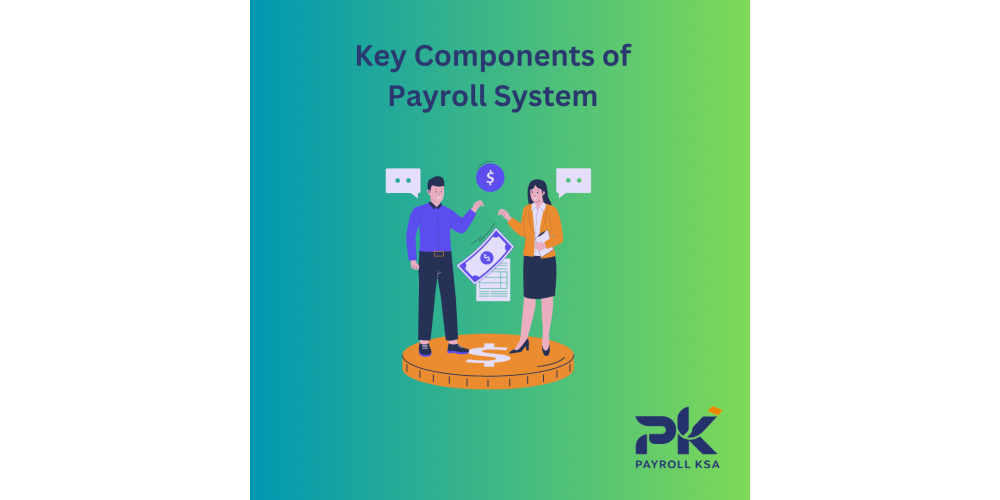
Key Components of the Payroll System
1.Salary Structure (Basic Salary, Allowances, Bonuses)
In Saudi Arabia, the salary structure is typically composed of several key components that together make up an employee’s total compensation. Here’s a detailed breakdown:
Basic Salary
- Definition: The core component of an employee’s compensation.
- Importance: Forms the basis for calculating other components like allowances and bonuses.
Allowances
Allowances are additional payments made to employees to cover specific expenses. Common allowances in Saudi Arabia include:
-
Housing Allowance
- Purpose: To assist with accommodation costs.
- Typical Amount: Often set at a percentage of the basic salary, commonly around 25-30%.
-
Transportation Allowance
- Purpose: To cover commuting expenses.
- Typical Amount: Also set as a percentage of the basic salary or a fixed amount.
-
Food Allowance
- Purpose: To cover daily meal expenses.
- Typical Amount: May be provided as a monthly allowance or included in meal vouchers.
-
Utility Allowance
- Purpose: To assist with utility bills like electricity, water, and gas.
- Typical Amount: Often a fixed amount or percentage of the basic salary.
Bonuses
Bonuses are additional payments given to employees based on performance or company profitability.
-
Performance Bonus
- Purpose: To reward individual or team performance.
- Frequency: Typically annual, but can be quarterly or bi-annual.
- Amount: Varies based on company policy and employee performance.
-
Annual Bonus
- Purpose: Often given at the end of the financial year.
- Amount: May be equivalent to one or more months’ salary.
-
Profit-Sharing Bonus
- Purpose: To share company profits with employees.
- Frequency: Usually annual.
- Amount: Depends on company profitability.
Other Financial Benefits
In addition to the basic salary and allowances, employees may receive other financial benefits:
-
Gratuity/End of Service Benefits (ESB)
- Purpose: A lump sum payment given at the end of employment based on the length of service.
- Calculation: Typically calculated as a number of weeks of salary for each year of service, with different rates for the first five years and subsequent years.
-
Overtime Pay
- Purpose: Compensation for hours worked beyond the standard working hours.
- Rate: Usually higher than the regular hourly rate, often 1.5 to 2 times the normal rate.
-
Holiday Pay
- Purpose: Additional pay for working on public holidays.
- Rate: Typically higher than the regular pay rate.
Non-Financial Benefits
These benefits are not directly monetary but add significant value to the overall compensation package:
-
Medical Insurance
- Purpose: Health coverage for employees and their dependents.
- Scope: Covers medical expenses, hospitalization, and sometimes dental and optical care.
-
Education Allowance
- Purpose: To assist with the education expenses of employees’ children.
- Amount: Varies based on company policy.
-
Annual Leave
- Purpose: Paid time off for vacation.
- Duration: Typically 21 to 30 days per year, depending on the length of service.
-
Sick Leave
- Purpose: Paid leave for illness.
- Duration: Usually up to 30 days per year at full pay, followed by a certain period at half pay.
Customary Practices
- 13th Month Pay: Some companies may provide an additional month’s salary at the end of the year as a form of bonus.
- Airfare Allowance: For expatriate employees, companies may provide an annual airfare allowance for a trip back to their home country.
2.GOSI (General Organization for Social Insurance) Contributions
Purpose: GOSI contributions are made to provide social insurance coverage for employees, which includes benefits such as pensions, occupational hazards, and unemployment insurance.
Contribution Rates:
- Employer Contribution: Employers contribute 10% of the employee’s gross salary to GOSI.
- Employee Contribution: Employees contribute 10% of their gross salary to GOSI.
- Total Contribution: The combined contribution is 20% of the employee’s gross salary.
Income Tax
- Current Status: As of now, there is no personal income tax on salaries for individuals working in Saudi Arabia. Employees receive their salaries without any income tax deduction.
Other Deductions
Apart from GOSI contributions, there may be other deductions based on company policies or specific circumstances:
-
Housing Loan Repayments
- Purpose: If the company provides housing loans to employees, repayments might be deducted from the salary.
- Amount: Typically a fixed amount agreed upon in the loan agreement.
-
Personal Loans or Advances
- Purpose: Deductions for personal loans or salary advances provided by the employer.
- Amount: As per the repayment schedule agreed upon by the employer and employee.
-
Savings Plans or Employee Provident Funds
- Purpose: Contributions to savings plans or provident funds set up by the employer.
- Amount: Typically a percentage of the salary, as agreed upon in the employment contract.
-
Company-Specific Deductions
- Purpose: Other company-specific deductions might include contributions to health insurance premiums or retirement funds.
- Amount: Varies based on company policy and employee agreement.
Legal Considerations
- Compliance: Employers must comply with the GOSI regulations and ensure timely and accurate deductions.
- Documentation: Employers are required to maintain proper documentation and records of all deductions made from employees’ salaries.
- Transparency: Clear communication with employees regarding the nature and amount of deductions is essential to avoid disputes.
Conclusion
In Saudi Arabia, while employees benefit from the lack of personal income tax, the mandatory GOSI contributions are significant and ensure social security benefits. Employers and employees should be well-versed in these deductions to ensure compliance and proper financial planning.
Request A Call Back
We will try and understand your system architecture & discuss details of what it will take for you to get 100% compliant.








